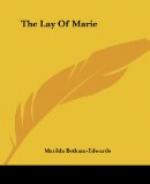And, watchful how he far’d, attendant stood;
Till now returning strength grew swiftly on,
And his firm voice confess’d his anguish gone.
In sooth, the fay, protectress of his worth,
Had shower’d down balm, unknown to wights on earth;
One night achieves his cure; but other smart
Plays o’er the weetless region of his heart;
Pains, such as beam from bright Nogiva’s eyes,
Flit round his bed, and quiral [Errata: genial] slumber flies.
Now, as the ruddy rays of morning peer,
Him seem’d his kind physician’s step drew near;
She comes; his cheeks with new-found blushes burn;
Nogiva—she, too, blushes in her turn:
Love sure had neither spar’d; yet at the last
Faintly she asks him how the night had pass’d?
O! how the trembling patient then confess’d
Strange malady at heart, and banish’d rest:
And sued once more for life, restor’d so late,
Now hers alone to grant, the mistress of his fate.
She speaks assurance kind with witching smile,
“No ill from sickness felt so little while!”
Yet nought the knight believes; a kiss, I ween,
Fell from her dainty lips, and clos’d the scene.
One year or more within some
secret bower,
So dwelt the knight beneath
the marble tower;
Thoughts of his sire, at last,
how he might bear
His son’s long absence,
so awaken’d care,
Needs must he back to Leon:
vainly here
Sues fond Nogiva’s interdicting
tear.
“Sad leave reluctantly
I yield!” she cries,
“Yet take this girdle,
knit with mystick ties,
Wed never dame till first
this secret spell
Her dextrous hands have loosen’d:—so
farewell!”
“Never, I swear, my
sweet! so weal betide!”
With heavy heart Sir Gugemer
replied;
Then hied him to the gate,
when lo! at hand
Nogiva’s hoary lord
is seen to stand,
(Brought by the fairy foe’s
relentless ire,)
And lustily he calls for knight
and squire:
Now with his trusty blade,
of temper good,
The stout knight clears his
course to ocean’s flood,
Sweeps right and left the
scatter’d rout away,
And climbs the bark of his
protectress fay;
Light glides the ebon keel
the waters o’er,
And his glad footsteps press
his native shore.
His father, who had long time,
woe-begone,
Bewail’d the absence
of his darling son;
Ween’d the best course
to hold him now for life,
Should be to link him closely
to a wife.
Sir Gugemer, urg’d sore,
at length avows,
He never will take woman’s
hand for spouse,
Save her’s, whose fingers,
skill’d in ladies’ lore,
Shall loose that knot his
mystick girdle bore.
Straight all that Bretany
contain’d of fair,
Widows, and dainty maids,
the adventure dare:
Clerks were they all, I ween;
but knots like these
May not be loos’d when
earthly beauties please.




